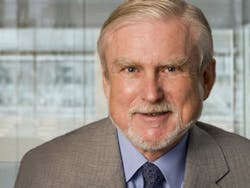Still, as the famed U.S. Army General George Patton (at left) once said, “Never take counsel of your fears.” And across the business community, many seem to be following that advice – preferring to view the current economic situation as a glass half-full of opportunity, rather than half-empty and wanting in prospects.
For example, look at some of the results from the latest Grant ThorntonInternational Business Report (IBR), a survey of 3,200 business leaders in 44 countries. On the heels of a pessimistic outlook back in the fourth quarter of 2012, U.S. business leaders are now showing signs of increased optimism in the performance of the nation’s economy – with optimism rising from negative 4% in the fourth quarter last year to 31% in the first quarter of 2013.
Stephen Chipman, Grant Thornton LLP’s CEO, said that this particular survey finding accompanies IBR data that reveals an improvement in sentiment about most areas of business performance and stability. For example, the net percent balance of U.S. business leaders expecting revenues to increase in 2013 rose by eight percentage points from the fourth quarter, with profitability expectations rising sharply too – up some 14 percentage points from the previous quarter.Encouragingly, hiring expectations in the U.S. still remain above the global average despite the poor job numbers from March, with a net balance of 29% of U.S. business projected increased hiring during the coming year; a four-percentage point increase from the previous quarter and five percentage points above the global average, Chipman (at right) noted.
“With the fiscal cliff and presidential election behind us, the anxiety has seemingly lessened among business executives,” he stressed. “While uncertainty is still present, it’s encouraging to see such a large increase in optimism among the nation’s business leaders—particularly when it comes to employment, which is key to U.S. economic health.”
The increase in optimism in the U.S. economy is on par with what is occurring in other markets, according to Grant Thornton’s findings, with global business optimism up to its highest level since early 2011. Globally, a net balance of 27% of businesses remain optimistic about the economic outlook – up from just 4% from the fourth quarter last year.
Investment managers are also growing more optimistic about the U.S. economy, according to a quarterly survey by Northern Trust, as positive expectations for housing, jobs and corporate profits outweighed concerns about the impact of across-the-board federal budget cuts (known as “the sequester”) that went into effect on March 1.
Now, a majority of the approximately 100 investment managers surveyed in mid-March by Northern Trust expect the automatic budget cuts to remain in place through the end of the quarter and more than one in three (37%) believe Washington D.C.’s spending reductions will have a negative impact on U.S. equity markets.
Yet 56% think sequestration will have a neutral impact on markets, and the vast majority of investment managers – 96% – forecast that the economic effects will either be in line with or less severe than current economic forecasts of a 1% reduction or less in U.S. gross domestic product (GDP), Northern Trust reported.
Significantly, the firm’s poll found investment managers were increasingly optimistic about several economic “fundamentals” for the U.S.:
- 88% expect housing prices to increase over the next six months – the highest reading since the survey began in the third quarter of 2008.
- 91% see corporate earnings either remaining the same or increasing over the next three months, while only 9% expect profits to decline – down from 32% who had a negative view in the fourth quarter of 2012.
- 38% expect job growth to accelerate in the next six months – up from 27% who had that view at the end of 2012.
- 46% say U.S. economic growth will accelerate over the next six months, up from 33% with that view in the fourth quarter. Only 11% think GDP growth will slow over the next six months, down from 21% last quarter.
BNY Mellon's Chief Economist Richard Hoey (at right) is another expert who believes the global economy will continue to expand this year, with a faster pace of growth close to 4% likely in 2014, based on the data he’s tracking.
While Hoey thinks economic growth in the middle months of 2013 may be temporarily sluggish due to the final phase of the overall European recession and the impact of U.S. fiscal tightening, he predicts faster U.S. economic growth should occur after Labor Day (which occurs on Sept. 2 this year)
"We expect a 'Labor Day inflection point' from the 2% growth rate of recent years to a new cyclical growth rate of 3% or more," Hoey stressed. "This would be an important 'Two Percent to Three Percent Transition' in the growth rate of the U.S. economy, [though] it is unlikely to occur until late 2013."
He also thinks the main “economic theme” now being played out is one revolving around a sustainable, global economic expansion.
“The primary reason for this is that we have easy monetary policy throughout the world,” Hoey explained. “Financial conditions are easy practically every place in the world, except peripheral Europe.
In the U.S., the stimulative monetary policy from the Federal Reserve is showing signs of working; auto sales are on a persistent uptrend; residential construction of new homes is improving; home prices are rising; and core capital spending orders, excluding some of the volatile items, stayed on a persistent uptrend in recent months.”
[Hoey delved more deeply into the roots of these positive trend lines as they began to take shape back in February, as you can watch in his report below.]
Though the U.S. does face the sequester’s impact for the next few months, which might give the nation a few months more of mixed economic numbers, Hoey thinks that – from Labor Day on – the U.S. economy will experience faster growth compared to the last several years.
“We’ve been just a touch over 2% real GDP growth for the last couple of years, which is a very, very weak recovery, but as we get further past the financial crisis, I think we can have somewhat better pace of growth,” he explained, noting that the U.S. household sector has also basically recovered all of its losses of net worth which, when combined with stock price gains in recent weeks, is helping rebuild consumer net worth.
Now, as far as Europe’s economy goes, Hoey isn’t as optimistic. “We’re still in recession [in Europe] and probably the recession in core Europe will end about the middle of 2013 – and the recovery’s likely to be relatively sluggish,” he said. “Peripheral Europe will stay in recession, in my view, throughout all of 2013. So, I don’t think Europe will have an economic recovery nearly as fast as what we’re likely to see after Labor Day in the U.S.”
That being said, Hoey believes Europe will expand moderately in 2014 and he does not expect a repeat of its broad financial crisis.
Not too shabby, methinks, after all the economic ups and downs we’ve experienced over the last several years. And if positive trend lines hold firm, trucking should witness some significant growth in freight demand as a result.






